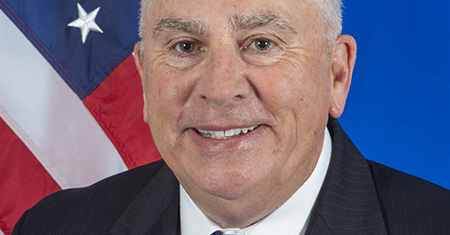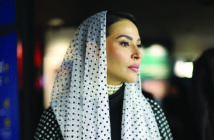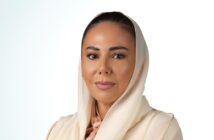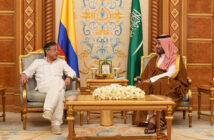Embassy of the United States of America
By ALEXANDER WOODMAN
How would you describe the bilateral ties of Saudi Arabia and the United States starting from the establishment in 1940? How has the approach to leadership and governance changed since the first meeting of President Franklin D. Roosevelt and King Abdulaziz Ibn Saud in 1945?
This year marks the 75th anniversary of the historic meeting between President Franklin Roosevelt and King Abdulaziz aboard the U.S.S. Quincy. For over seven decades, through 15 U.S. administrations and seven Saudi kings, Saudi Arabia has been, and continues to be, an important strategic partner in maintaining stability in the Gulf, protecting American interests in the Middle East, and ensuring the free flow of commerce through the Gulf region. The relationship between the United States and Saudi Arabia is strong and multifaceted. We work together every day to protect the security of our two countries, promote prosperity and economic development, and build the people-to-people ties that keep our relationship strong. Since the foundation of Saudi Arabia, leaders of both our countries have always recognized the importance of this relationship.
Along with prolific and productive relations, the governments of the two countries also witnessed several crises. For example, reflecting on COVID-19 pandemic, please discuss the importance of wise leadership while confronting this pandemic.
The COVID-19 pandemic is a great example of the United States and Saudi Arabia working together. For more than 30 years, the U.S. Centers for Disease Control and Prevention (U.S. CDC) has been working in partnership with Saudi Arabia. The Embassy had a CDC expert based here in Riyadh since long before the COVID-19 pandemic, working with the Saudi Center for Disease Prevention and Control (Saudi CDC) to identify and control disease outbreaks. Today these American and Saudi experts are partnering to defeat COVID-19.
Speaking of leadership, how would you define the ruling system of modern Saudi Arabia? What are the main factors for the successful leadership of Crown Prince Mohammed bin Salman?
The Crown Prince has outlined an ambitious plan for the country’s future. I am pleased that U.S. companies actively cooperate in the realization of Vision 2030 goals. AMC opened in 2018 the first cinema in the country in 35 years, and Six Flags has signed an agreement with Qiddiya to establish a theme park in the new entertainment city. Our goal is for the United States to be Saudi Arabia’s preferred partner for Vision 2030 transformation efforts by encouraging more U.S. firms to come to Saudi Arabia.
What could be the third alternative sector of trade between Saudi Arabia and the U.S. that will be as successful as the current two main sectors: oil and security?
Saudi Arabia and the United States have a substantial bilateral economic relationship totaling over $39 billion in two-way trade of goods and services. Investment is robust, flowing in both directions. U.S. companies are key investment partners in strategic Saudi industries – not just traditional industries such as oil and gas, but also growing sectors like entertainment. Aramco, SABIC, the Public Investment Fund (PIF), and other Saudi companies have significant investments in the United States.
People-to-people exchange is robust. Many hundreds of thousands of American Muslims have visited the holy cities of Mecca and Medina over the decades, and as tourism infrastructure grows in Saudi Arabia, I believe many more Americans will come to get acquainted with the Kingdom. Education and research are also a significant part of our relationship. Saudi Arabia is in the top five countries in the world in numbers of students studying in the United States and there are numerous cultural and educational exchanges between our two countries. Since 2010, over 900,000 non-immigrant visas have been issued to holders of Saudi nationality, underscoring the flow of people and ideas between our two countries.
Saudi Arabia presides over the G20 2020. Can you discuss what has been the essential and most significant contribution of Saudi Arabia since its inclusion as a Member State in 2008?
The United States congratulates Saudi Arabia on its G20 Presidency. This is a special opportunity for Saudi Arabia to highlight economic and social reforms that are transforming the country and to lead G20 discussion on key issues facing the global economy such as the virtual G20 leaders’ meeting it convened in March to address the COVID-19 pandemic.
In addition to diplomacy, can you discuss the joint efforts of the U.S. and Saudi Arabia to strengthen cultural, educational, and interpersonal ties between people?
We work closely with Saudi institutions and organizations, U.S. academic institutes, and private sector partners on a variety of programs, including scholarships, training, and cultural programs. We sent more than 100 Saudi professionals, both in the private and public sectors, on short-term exchange programs to the United States last year, where they engaged with counterparts from all over the world from their respective fields. In addition, more than a dozen Saudi academics and experts are on long-term exchange programs to conduct research and teach at various U.S. institutes, colleges, and universities.
The U.S.-Saudi educational partnership has a long history of success, as hundreds of thousands of Saudis have been educated in America. The U.S. Mission maintains a vibrant EducationUSA program to help Saudi students find educational opportunities in the United States. Roughly 40,000 Saudis currently study in the United States, making Saudi Arabia the fourth-leading place of origin for foreign students. According to the Institute for International Education’s Open Doors Report, there have been on average approximately 50,000 Saudi students studying in the U.S. each year since 2012, many of them accompanied by family members.
The U.S. Embassy is located in the Diplomatic Quarter; how does this placement impact on the multilateral projects of the international offices in the DQ? In your opinion, how does the concept of Diplomatic Quarter contribute and strengthen bilateral relations of foreign missions with KSA?
To commemorate the 75th anniversary of the Quincy meeting, the Embassy organized a series of concerts, in partnership with Diplomatic Quarter General Authority (DQGA), which brought together U.S. and Saudi musicians on one stage. The concerts were open to the public, turnout was great as hundreds of people gathered to watch and listen, and people enjoyed themselves. The concentration of foreign missions on the DQ certainly makes it more efficient to interact with many colleagues from other countries, but I have also enjoyed seeing the rest of Riyadh and the Kingdom to gain a fuller picture of the richness of Saudi Arabia.
Saudi Arabia was the first country where you were appointed as an ambassador. What is your vision for this new field of experience? What are the challenges?
As some of your readers know, I spent much of my U.S. Army career in this region, and it is a real privilege to work here again. I am honored to be representing the United States in the Kingdom of Saudi Arabia at this pivotal time. I hope that during my time in Saudi Arabia we can continue to strengthen the ties between our countries, position the United States as the top bilateral partner of Vision 2030, and continue confronting the world’s foremost challenges, including the current pandemic, the economic downturn, and the threat of terrorism.
What is your daily routine?
My day begins in Quincy House, which has been the home of U.S. Ambassadors to the Kingdom for many years. Of course, Quincy House is named from the ship on which President Roosevelt and King Abdulaziz held their famous meeting in 1945, and I am very pleased that the house has been a place where American and Saudi leaders have met with one another often over the years, continuing that great spirit of friendship. I spend my day communicating with various members of our large U.S. Embassy team who are spread out across the Kingdom, doing all sorts of great work to promote ties between the United States and Saudi Arabia. I am also in frequent touch with our Saudi partners. Even though COVID-19 has made it more challenging to move around the city and country, our team has remained hard at work.
What is your favorite place to visit in the DQ?
I enjoy the trails around the perimeter of the Diplomatic Quarter, and especially the stunning views at sunset. It’s exciting to see the transformation taking place in the Diplomatic Quarter as more businesses open up in Oud Square and events like the Farmer’s Market take place that draw visitors into the neighborhood. I’m thrilled that we at the Embassy have worked with the DQ General Authority to host concerts at some of these venues, and I hope we can continue helping to make the DQ a great place to live, work, and relax.
Do you have any recommendations for places to visit or activities in Riyadh?
I think historic Diriyah is a wonderful and fascinating place to learn about the history of the Najd region and the Al Saud family. I am very impressed with the work that has taken place to help tourists from all over the world appreciate that history.




